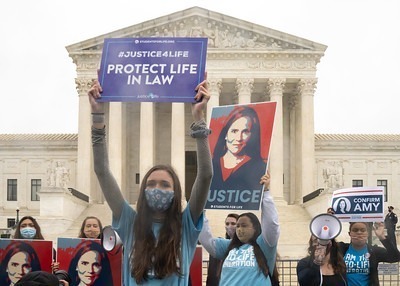The partisan brawl of the Supreme Court hearings stirred up a commotion across the pond. The function of the confirmation procedure was to determine whether President Donald Trump’s nominee Amy Coney Barrett was fit for the job – and the senate voted on Monday that she was.
In the course of last Tuesday’s hearing, when Barrett was asked whether she was held accountable for any discrimination, she retorted: “I have never discriminated on the basis of sexual preference.”
In response, Democratic Senator Mazie Hirono criticised Barrett for using the term “sexual preference” which she said was “derogatory” and “outdated”.
Hirono noted that such language is used by anti-LGBTQ activists to suggest sexual orientation is a choice. But such appeals to political correctness aim to silence and shame people who dare to disagree. And the Democrats are on a perpetual fishing expedition for offence.
Censored for daring to disagree
It seems that such politicians as Senator Hirono cannot reconcile themselves to the fact that freedom of speech must include the freedom to offend. Nor is this only a problem in politics.
Take the case of Cailin Jeffers, an American student who lost a mark on an essay for using the non-gender neutral word “mankind”: she is a living testimony to the extent to which identity politics have established their grip on the United States.
Or the University of California, Berkeley, which, ahead of a 2017 visit by conservative speaker Ben Shapiro, offered students a counselling service, should they feel “threatened” by any speakers.
The media too takes a view. CNN did not hesitate to publish an article explaining why Judge Barrett’s use of the phrase “sexual preference” was seen as offensive. They suggested that her rhetoric was in line with the anti-homosexual ideas promoted by right-wing groups (without specifying which groups are implied).
Of particular concern is how many sweeping assumptions were extrapolated from one phrase. And this hostility is not confined to CNN. For instance, USA Today went so far as labelling Barrett’s speech as “alarming”.
Political correctness and its double standards
It is not so long, however, since the term “sexual preference” laced the speeches of Hirono’s fellow Democrats, including Michael Nutter and Keith Ellison. Both used the exact same “offensive phrase” while defending the right of all people to vote.
As the Washington Post affirmed: “Plenty of figures on the left — including Democratic presidential nominee Joe Biden and the late Justice Ruth Bader Ginsburg, whom Barrett is hoping to replace on the high court — have also used the phrase, which was considered acceptable, as recently as a decade or two ago.”
But apparently, it is one rule for the Democrats and another for everybody else.
Politicising religion
The hostility towards Judge Barrett comes as no surprise: as a Catholic conservative, she is the perfect candidate for cancel culture. Barrett is unflinching in her traditional values, including the Christian teaching that life begins at conception.
Her beliefs, however, are being politically used by the Democrats, including vice-presidential candidate Kamala Harris, who has framed Trump’s nomination of Barrett as an attempt to “roll back Americans’ rights for decades to come”.
While objectivity has always been seen as a vital quality for judges, religious affiliation did not use to be seen as an obstacle to the course of justice. It used to be more controversial to proclaim oneself an atheist than a religious fundamentalist in the US.
To come out as the most devout Catholic in the US should not be deemed controversial. According to the Pew Research Centre, the US tops the list of countries with the largest Christian population.
This piety cannot be written off as just a fad. It is derived from one of the most salient documents of the US – the Declaration of Independence- which construed faith in God as a projection of the independent American spirit.
Even the most sceptical of the founding fathers, Thomas Jefferson, while downplaying the veracity of miracles, still held the Bible in high regard as a bulwark against “the tyranny of the majority”.
When the future of the US is at stake, American politicians should reach out to their ancestors and consult the legacy of the Founding Fathers.
Instead, we are witnessing a sea change: what was deemed conventional now is turned on its head and proclaimed countercultural. Andrew Murray in his book Madness of the Crowds pithily deconstructs this tendency and reveals how the West clings to sacralised atheism, which has superseded traditional religion.
The last generation, according to Murray, swapped Christianity for the religion of “identity politics”, “political correctness” and “intersectionality” – a new faith it professes with zeal. Therefore, Barrett’s pro-life and traditional marriage views are viewed as dangerous and countercultural by the left-wingers. And she is viewed as a “phantom enemy“, a heretic who trespassed the doctrines.






